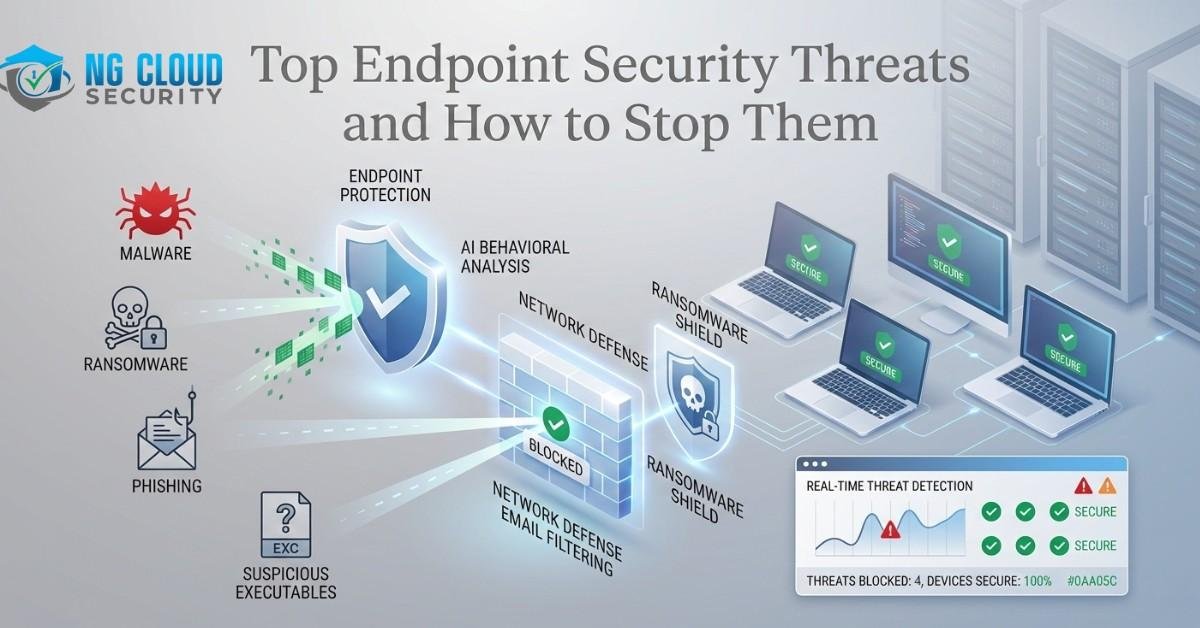Top Endpoint Security Threats and How to Stop Them
Endpoint Security Threats are becoming one of the biggest cybersecurity challenges in today’s digital landscape. As cyber threats evolve rapidly, organizations must stay proactive in protecting endpoints such as laptops, desktops, and mobile devices from unauthorized access and attacks. NG Cloud Security helps businesses strengthen endpoint protection through advanced security solutions designed to detect, prevent, and respond to modern cyber threats effectively.networks. NG Cloud Security, a leading provider of cloud security solutions, offers comprehensive services to safeguard enterprises against these threats.
Understanding Endpoint Security
Endpoint security refers to the practice of securing end-user devices such as laptops, desktops, and mobile devices from cyber threats. These endpoints serve as entry points into an organization’s network, making them prime targets for cybercriminals. Effective endpoint security involves a combination of technologies and practices to prevent, detect, and respond to threats.
Top Endpoint Security Threats
1. Phishing Attacks
Phishing remains one of the most prevalent threats, involving deceptive emails or messages that trick users into revealing sensitive information. Attackers often impersonate trusted entities to gain access to corporate networks.
2. Malware and Ransomware
Malicious software, including viruses, worms, and ransomware, can compromise endpoints by exploiting vulnerabilities. Ransomware encrypts data, demanding payment for decryption keys, while other malware types can steal or corrupt sensitive information.
3. Zero-Day Exploits
These are attacks that exploit previously unknown vulnerabilities in software or hardware. Since there is no patch available at the time of the attack, zero-day exploits can be particularly damaging.
4. Insider Threats
Employees or contractors with access to internal systems may intentionally or unintentionally cause harm. These threats can be challenging to detect, as insiders often have legitimate access to critical systems.
5. Advanced Persistent Threats (APTs)
APTs involve prolonged and targeted attacks aimed at stealing data or compromising systems over an extended period. These attacks are often carried out by well-funded and skilled adversaries.
How NG Cloud Security Helps Mitigate These Threats
NG Cloud Security provides a suite of services designed to enhance endpoint protection:
1. Endpoint Security Assessment: NG Cloud Security offers comprehensive assessments to detect vulnerabilities and harden endpoint defenses, ensuring robust protection against potential threats.
2. Enterprise-Grade Protection: Leveraging advanced technologies, NG Cloud Security delivers enterprise-grade endpoint protection that helps detect, prevent, and respond to attacks, whether they originate internally or externally.
3. Ransomware Resilience: By integrating solutions like Microsoft Defender, NG Cloud Security assists businesses in building ransomware-resilient endpoints, significantly reducing the risk of successful attacks.
Best Practices for Endpoint Security
To bolster endpoint security, organizations should consider the following best practices:
1. Regular Software Updates: Ensure that all software and systems are up-to-date with the latest security patches to mitigate vulnerabilities.
2. Employee Training: Educate employees about recognizing phishing attempts and safe internet practices to reduce the risk of human error.
3. Multi-Factor Authentication (MFA): Implement MFA to add an extra layer of security, making it more difficult for unauthorized users to gain access.
4. Data Encryption: Encrypt sensitive data both at rest and in transit to protect it from unauthorized access.
5. Endpoint Detection and Response (EDR): Utilize EDR tools to monitor and respond to suspicious activities on endpoints in real-time.
The Importance of a Layered Security Approach
A single security measure is insufficient to protect against the diverse range of cyber threats targeting endpoints. NG Cloud Security advocates for a multi-layered security strategy that combines various technologies and practices to provide comprehensive protection. This approach ensures that if one layer is breached, others will still provide defense against potential threats.
Conclusion
As cyber threats continue to evolve, safeguarding endpoints has never been more critical. Organizations must adopt a proactive and comprehensive approach to endpoint security. Partnering with trusted providers like NG Cloud Security can help businesses implement effective strategies to protect their networks and data from emerging threats.
